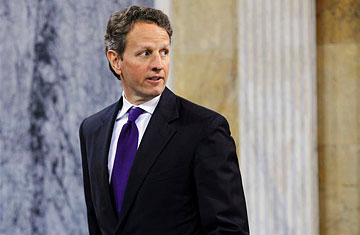
U.S. Treasury Secretary Tim Geithner prepares to speak at the Treasury Department in Washington on March 29, 2010
When U.S. Treasury Secretary Tim Geithner last visited Beijing about a year ago, he elicited guffaws from an audience of college students when he assured them that China's massive investments in U.S. government debt was sound. Today's spur of the moment trip to Beijing, where he met with Wang Qishan, China's point man on international economics, was not a moment for more public appearances, let alone yuks. This was business.
After weeks of intemperate rhetoric on both sides of the Pacific — on issues ranging from trade to the Dalai Lama to Taiwan — cooler heads in both Beijing and Washington now seem to be back in control. Barack Obama and Hu Jintao had an hour-long phone conversation last week, after which the Chinese President agreed to attend a nuclear summit in Washington. And on the volatile issue of trade, a grand bargain of sorts now appears to be taking shape: In return for delaying a decision on whether to list China as a "currency manipulator" — long a dream of protectionists in Congress — China is sending signals that it will soon allow its currency, the renminbi, to appreciate. "The Chinese know very well it's in their own interest to allow the RMB to rise a bit," a source close to Treasury in Washington said just before Geithner's surprise Beijing trip. "But they weren't going to be browbeaten into it."
Both politically and economically speaking, this gets it about right. The reason it's in China's economic interest to allow the RMB to rise a bit is plain enough: At a moment when much of the world is still trying to climb out of a disinflationary hole, China's got a burgeoning inflation problem. Prices are rising at about 3% annually now, and it's now got its own real estate bubble to deal with. Cooling things off a bit is clearly the government's priority this year, and a rising currency helps. It makes imports more affordable for Chinese consumers, and thus puts pressure on domestic producers to hold the line on price increases. But the Chinese leadership needed to ensure that it appears to be making the move of its own volition, and for its own reasons.
Those reasons extend beyond an overstimulated domestic economy. The geopolitics of the move are also pressing for Beijing. Though exports collapsed last year as the world plunged into recession — China's current account surplus declined by about half as a percentage of its overall economy — that adjustment phase is over. Exports will again add to GDP growth in China this year, and in an era of high unemployment in the U.S. and Europe, the potential for a serious protectionist backlash is very real. (Indeed, a team from Treasury slipped quietly into Beijing recently to make just this point.) For administrations going back to Ronald Reagan in the 1980s, it's been a tried a true strategy: Tell your trading partner to give you something, because you might not be able to hold back the heathen protectionists in Congress. However hoary a tack it may be, that doesn't make it any less true. Democrats in Washington are very nervous about November's mid term elections, and 'jobs' is the number one issue.
The question is whether anything other than a massive, one-off revaluation in the RMB versus the dollar — something that is not in the cards — will have any significant impact on employment in the U.S. or Europe. Economists differ around the edges of this debate, but most agree that a big employment impact is unlikely given a RMB rise of, say, 10% over the next year or two. "The thread between the two [revaluation and jobs] is very, very thin," says Derek Scissors, an economist at the Heritage Foundation in Washington. "No currency revaluation of any feasible size will create more than a few thousand American jobs.''
As both Geithner and Wang Qishan well understand, there are other compelling reasons for the RMB to rise. A revaluation will help China rebalance its economy by increasing the attractiveness of imports from everywhere; both developing nations like Vietnam and Thailand, whose own industrial development has been stunted by an undervalued RMB, to traditional manufacturing powers like Japan and South Korea will all likely benefit. That fact might not win votes in rust belt America — and the U.S. Congress may be only temporarily appeased — but it is a fact: The global economy desperately needs China to pull more weight, and a stronger RMB helps.
